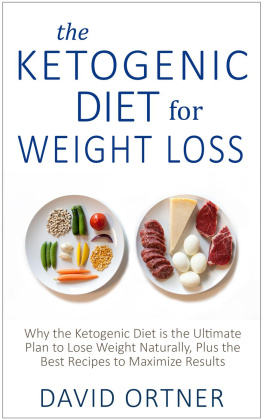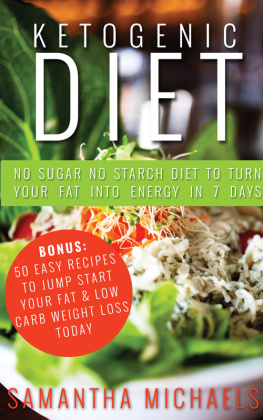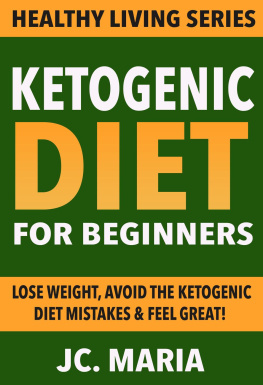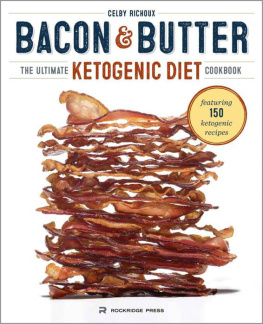Ketogenic Diet
Tips and Strategies to Adapting to the Lifestyle and Sticking to It, Recipes for Delicious Meals, and Everything You Need to Know About Going Ketogenic Like a Pro!
JAMES KAPLAN
Text Copyright Author
All rights reserved. No part of this guide may be reproduced in any form without permission in writing from the publisher except in the case of brief quotations embodied in critical articles or reviews.
Legal & Disclaimer
Legal & Disclaimer
The information contained in this book is not designed to replace or take the place of any form of medicine or professional medical advice. The information in this book has been provided for educational and entertainment purposes only.
The information contained in this book has been compiled from sources deemed reliable, and it is accurate to the best of the Author's knowledge; however, the Author cannot guarantee its accuracy and validity and cannot be held liable for any errors or omissions. Changes are periodically made to this book. You must consult your doctor or get professional medical advice before using any of the suggested remedies, techniques, or information in this book.
Upon using the information contained in this book, you agree to hold harmless the Author from and against any damages, costs, and expenses, including any legal fees potentially resulting from the application of any of the information provided by this guide. This disclaimer applies to any damages or injury caused by the use and application, whether directly or indirectly, of any advice or information presented, whether for breach of contract, tort, negligence, personal injury, criminal intent, or under any other cause of action.
You agree to accept all risks of using the information presented inside this book. You need to consult a professional medical practitioner in order to ensure you are both able and healthy enough to participate in this program.
Table of Contents
Introduction
What is a Ketogenic Diet?
How Does a Ketogenic Diet Work?
How Does a Ketogenic Diet Compare to 'Traditional' Diets?
Is the Ketogenic Diet Dangerous?
What Should I Know & Do Before Starting?
Check With Your Physician
Who Should Not Follow a Ketogenic Diet?
Pros & Cons of the Ketogenic Diet
Counting Macros vs. Calories?
What Are Macros?
Does Counting Calories on Keto Help?
Weight Loss & Muscle Building
Is it Possible Not to Lose Weight on a Ketogenic Diet?
What Can I Do If I Plateau?
Intermittent Exercise & Fasting
Okay Foods, Meal Plans & Other Important Information
Do You Need Any Special Equipment?
What Foods Can You Eat?
Foods You Should Absolutely Avoid
How Can You Make This Work For You?
Determining Your Numbers and Cooking For One
Finding Meal Plans That Fit Your Life
You Can Enjoy Snacks & Even Dine Out!
Example Recipes
Conclusion
Introduction
Many people would say that they got fat because they got lazy and started to eat more. But what if it was the other way around? What if those people just got fat and simply became less active which led to them eating more?
For the past several decades we have been provided advice about nutrition that has been found to be inaccurate, at best. At worst, some of that information has proven to be entirely false. Nutritionists and physicians know that some studies from the 1950s to today have been severely manipulated. The reason being that many of these studies received funding from companies that produce foods and food additives that are not good for us. These studies build the foundation of the food pyramid that has been taught in schools since the 1960s and has led us to what we have been told is a 'balanced diet'.
Originally developed in 1924 by Dr. Russell Wilder at the Mayo Clinic, the ketogenic diet was very effective in the treatment of epilepsy that didn't respond to the current medications for that disease. Despite the studies showing how effective the diet was in treating epilepsy, especially in young children, it fell out of favor after the discovery of new anti-seizure medications in the 1940s.
The ketogenic diet is very closely related to the paleolithic diet which also excludes most carbohydrates. Unfortunately, today's diet consists of a high level of carbohydrates which cause significant changes in our health. Carbohydrates are by far the most fattening ingredient in our diets even beyond the amount of pure fat we consume.
The ultimate goal of following a low-carbohydrate ketogenic diet is to improve your heath by making your body burn ketones rather than glucose for energy. Within this book you will learn what the ketogenic diet is and how it works, things you should know and do before starting this diet plan, and how to make it work for you.
By following a balanced ketogenic diet, you can feel good in your own skin again! You'll have more energy, your skin and hair will be smoother and more healthy, not to mention the reduction of stress, depression and anxiety that can nag you as you go about your day.
What is a Ketogenic Diet?
Quite literally, the ketogenic diet is a high-fat, moderate-protein, low-carbohydrate diet that was originally used to treat epilepsy in children who did not respond well to the medicines available at that time.
This diet forces the body to burn fats for energy rather than carbohydrates. The body converts the carbohydrates in our food into glucose which is then sent throughout the body to be used as energy. Unfortunately, if you take in more carbohydrates than you need for the amount of energy you use during a day the excess glucose is converted to fat and stored rather than being eliminated. However, if you restrict the amount of carbohydrates ingested, the liver will begin converting fat into fatty acids and ketone bodies. Once ketones in the blood outnumber the molecules of glucose, the cells of your body will begin using those ketones as their source of energy.
How Does a Ketogenic Diet Work?
The ketogenic diet shifts the body's metabolism from utilizing glucose as energy to ketones. While it doesn't guarantee instant weight loss, it is an effective tool to help you reach your goals of living healthier.
First, you are going to be eating very satisfying and nutritious foods that will make you experience fewer cravings and be hungry less often. Today's nutritionists won't tell you that good fats cause satiation, not fruits and veggies. It has been determined through medical studies that protein and fats are the most satisfying of the three macronutrients you will be concerned with when following this new lifestyle.
Second, eating fats actually helps your body burn the fat you already have stored so that you can lose weight a bit more easily. Carbohydrates cause the body to produce insulin to move glucose molecules into the cells to be used for energy. Unfortunately, nearly everyone who is overweight for a long period of time will experience some form of insulin-resistance even if they have not been diagnosed as diabetic. This means that you will experience both high and low blood sugar levels as well as more cravings.
And third, you will be able to achieve greater weight loss due to the metabolic advantage the low-carbohydrate diet supports. When your liver break fats down there are always more ketones than your body can actually use so the excess is excreted through urination. However, that loss of potential energy is not too great so you won't even miss it.
How Does a Ketogenic Diet Compare to 'Traditional' Diets?
You may have tried one or two or many of the more traditional diets and had a couple weeks to a few months worth of weight loss but found it very easy to let's say, fudge your diet? And I mean that literally fudge can be a big downfall. Am I right?












